Australia's
bushfires: More
evacuations, fears hundreds
of homes destroyed
RNZ,
5 January, 2019
The New South Wales rural fire service and fire authorities in Victoria fear hundreds of properties have been destroyed during fire storm conditions in many parts of each state.
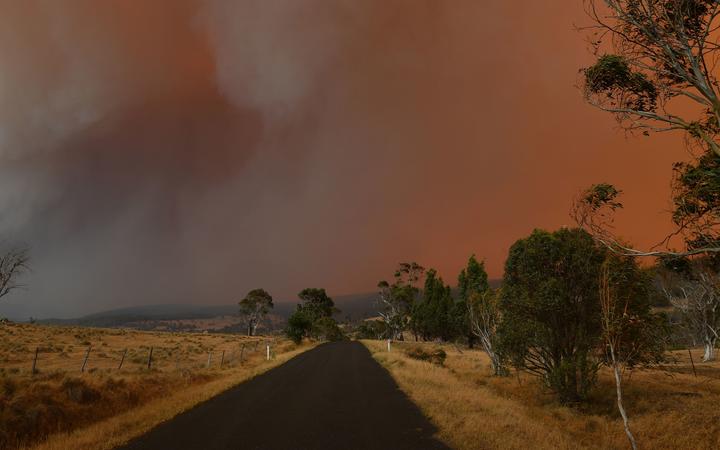
NSW Premier Gladys Berejiklian says the state is in "uncharted territory" as it battles the bushfires. Photo: AFP
Temperatures spiked into the forties yesterday as thousands of firefighters did their best, but the scale of the fires proved too much in many areas.
A cool change has swept north through Victoria and New South Wales today, dropping temperatures by as much as 20 degrees from 24 hours ago.
But two fires remain at emergency level in New South Wales: the Morton fire at Bunnadoon in the southern highlands and south in the Bega Valley.
Hundreds of people sheltering in the New South Wales coastal town of Eden are being told by police to leave the area immediately if they are not able to defend themselves.
A police officer warned tourists and those not able to defend their homes to leave and to "listen carefully" to his briefing this morning.
"We cannot guarantee your safety at present under the conditions that we have now here at the Eden Wharf," he said.
Officers warn there is now an "imminent risk" from the Border fire burning to the south, and people should leave for evacuation centres in Merimbula or Bega.
"They are considered the safest places to be at this particular time," the officer said.
There is an emergency warning for the fire, which has burned more than 20,000 hectares.
Police say they will arrange transport from the wharf for those who don't have the means to travel.
Despite the advice, some people have decided to stay in Eden.
Read more on the Australian bushfires:
- Two people die in bushfires that ravaged large parts of Kangaroo Island in South Australia.
- Bushfires threaten dozens of communities in Victoria, a southerly cool change fans problems in NSW, and more than a third of Kangaroo Island has burned in South Australia.
- Members of the Royal Family have said their "thoughts and prayers" are with Australians affected by the massive bushfires.
- Australia's Prime Minister Scott Morrison has been condemned for releasing videos on social media advertising his government's response to the bushfire crisis.
The New South Wales RFS says there are reports of property losses in the hundreds from yesterday's fires, while one person died near Batlow.
Sydney and Canberra set new temperature records as predictions of a bushfire nightmare came true and more than a dozen emergency warnings were issued as flames tore through several areas.
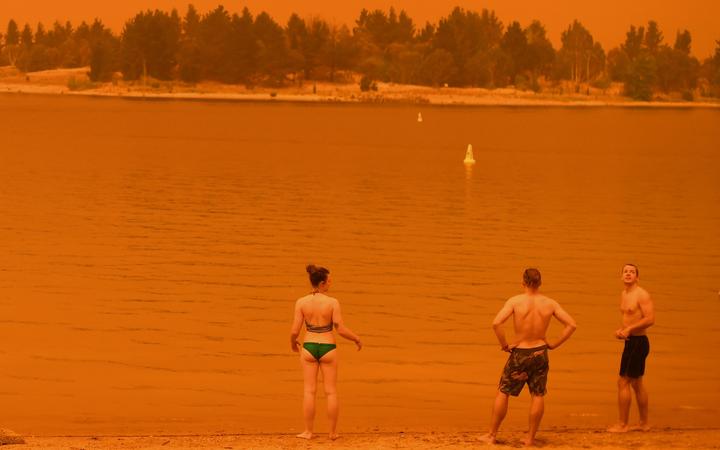
Residents take a dip to cool down at Lake Jindabyne, under a red sky due to smoke from bushfires, in the town of Jindabyne in New South Wales.Photo: AFP
RFS Commissioner Shane Fitzsimmons said there was widespread destruction and "we can expect to see property damage probably number in the hundreds".
The Southern Highlands, Snowy Mountains and South Coast were the worst affected areas, while the mercury at Penrith reached 48.9C - a new record for the Sydney basin.
A new temperature benchmark was also set in Canberra (44C).
Fitzsimmons said a 47-year-old man had died after a suffering cardiac arrest in Batlow.
Four firefighters were also injured yesterday and taken to hospital, but have since been released.
NSW Premier Gladys Berejiklian said the state was in "uncharted territory".
"The extent of this bushfire season in living memory, and many experts have been around much longer, who fought fires and observed circumstances, all agree, we're in uncharted territory," she said.
"How people interpret that is up to them. As the Premier of this state, our state is facing a difficult time ahead."
NSW's Energy Minister Matt Kean urged people to cut their power use, after bushfires destroyed two electricity substations, sparking supply issues.
A statewide total fire ban is in place in NSW today, and while conditions have eased, moderate winds are expected to fan more than 160 blazes around the state.
RFS Deputy Commissioner Rob Rogers said firefighters would take advantage of favourable weather.
"We have to start the process of getting some sort of containment on these fires," he said.
Transport Minister Andrew Constance, whose electorate of Bega has been among the worst affected by fires, compared the blazes to "an atomic bomb".
"I've got to be honest with you, this isn't a bushfire it's an atomic bomb," he told ABC Radio Sydney.
"It's indescribable the hell it's caused and the devastation it's caused."
More support from NZ
Minister of Defence Ron Mark has announced New Zealand is sending three Royal New Zealand Air Force NH90 helicopters and crew, and two NZ Army combat engineer sections as well as a command element to support the Australian Defence Force efforts in tackling the Australian fires.
They will head to Australia over the next three days.
"This latest NZDF support is being provided in addition to the latest rotation of five NZDF firefighters deployed to bolster numbers of emergency responders on the ground," Mark said.
He said he was especially grateful to the people whose holidays had been disrupted by the need to help out in Australia.
The NZDF contingent will be based at the Royal Australian Air Force Base Edinburgh, in Adelaide, and will remain in Australia at least until the end of January. The NH90s will undertake transport tasks.
Victoria remains on alert
Victorian authorities are warning communities in the north-east and East Gippsland to remain on alert despite today's cooler conditions as 39 fires continue to burn across the state.
Two people have died, six are missing and at least 110 properties and 220 outbuildings have been lost to the fires this week, while 923,000 hectares have been blackened.
Authorities downgraded a number of emergency warnings to watch and act this morning, but fires in East Gippsland and near Corryong in the state's north-east remain at emergency level, and evacuation warnings remain in place for parts of the high country.
The CFA's State Agency Commander, Peter O'Keefe, said the number of property losses was expected to grow as teams were able to conduct damage assessments.
"We are expecting significant property and stock losses further as we do our impact assessments over the next days and weeks," he said.
Victoria's Emergency Management Commissioner Andrew Crisp said the Corryong fire appeared to have destroyed properties, including at Tintaldra and Towong.
It is not yet clear whether homes have been lost.
One firefighter suffered burns last night in the Tintaldra area and was flown to Wangaratta for treatment.
There are fears this fire could merge with another burning in NSW, but cloud cover prevented emergency services from seeing how far the fire had spread overnight.

Firefighters tackle a bushfire in the town of Moruya, south of Batemans Bay, in New South Wales. Photo: AFP
Rain unlikely to bring much relief
Rain is expected to fall across much of the state today, and has already arrived in parts of East Gippsland such as Bairnsdale, but it is unlikely to be enough to make the task of firefighters much easier.
Bureau of Meteorology forecaster Grace Legge said fire-affected areas would receive "some rainfall, unfortunately not huge amounts".
The north-east is expected to only receive about 5 millimetres, while parts of East Gippsland could receive up to 15mm.
"Temperatures have dropped significantly compared to yesterday and it is a moister air mass, allowing the relative humidities to increase over most areas," she said.
Firefighters are hoping to take advantage of the milder conditions today to make inroads on the fires before hotter conditions return later in the week, the CFA's O'Keefe said.
"Where it's safe to do so, our crews will move into the fire and where they can attack the fire directly," he said.
Military steps up relief work
At least 50 American firefighters have joined more than 1000 local firefighters battling Victorian blazes, and military relief efforts are ramping up.
In East Gippsland, about 100 Army personnel moved into Bairnsdale Secondary College yesterday.
Yesterday, Army helicopters were used to help dozens of people escape the fierce fire threat in Omeo in East Gippsland, and the Navy and Air Force have taken about 1200 people out of the coastal town of Mallacoota.
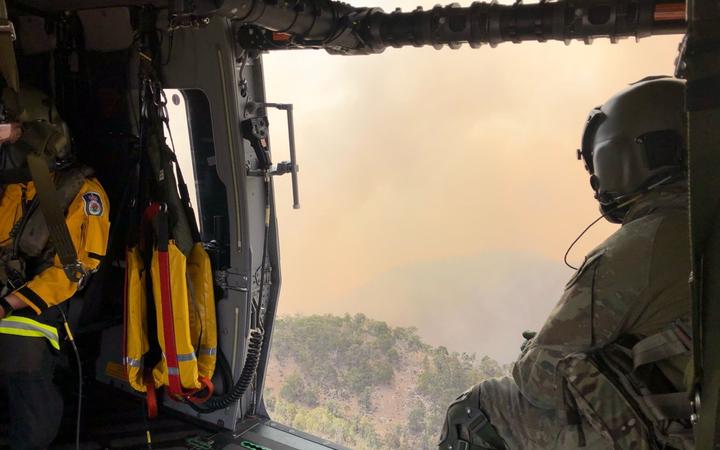
Army helicopters are being used to help with evacuations in the worst-hit areas. Photo: Facebook / Australian Defence Force
The Navy ship HMAS Choules is expected to return to Mallacoota today, where more than 350 people are still waiting to leave.
Smoke hampered efforts to get aircraft into the town yesterday.
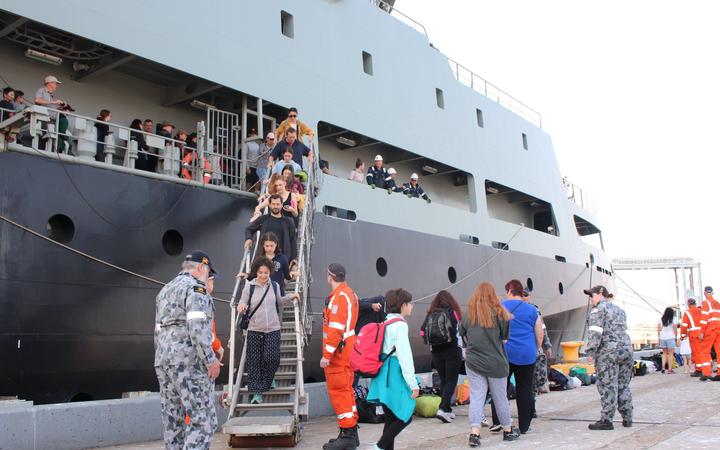
Some Mallacoota residents leave the Navy ship HMAS Choules. Photo: Facebook / Department of Defence
Some lose homes and jobs
Mallacoota resident Mark Tregellas said the town's second largest employer, its abalone co-operative, had been destroyed by fire.
"So we've had some people in town who have lost all of their possessions, lost their home and lost their employment.
"I don't know what they're going to be able to do."
Federal Health Minister Greg Hunt said 450,000 P2 face masks from a national stockpile were being provided to at-risk Victorians and frontline workers.
"Although these P2 masks have been held in the National Medical Stockpile for use in pandemics, I have made them available today because of the urgent need," Hunt said.
Governor-General David Hurley is planning to spend the day at Gippsland relief centres with residents who have left their homes.
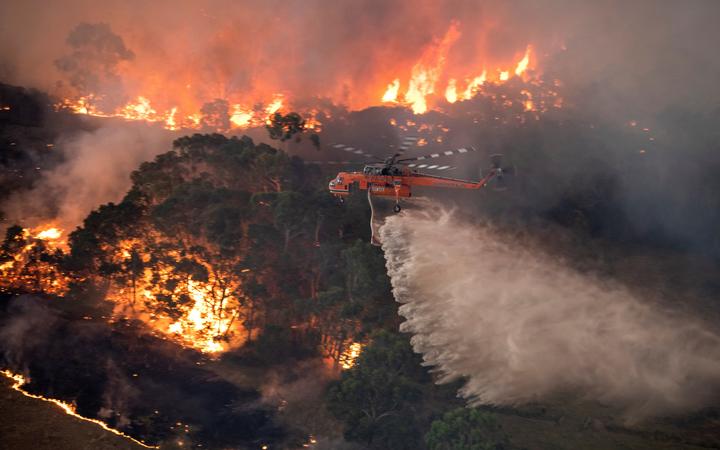
A helicopter fights a bushfire near Bairnsdale in Victoria's East Gippsland region. Photo: AFP / State Government of Victoria
- ABC



No comments:
Post a Comment
Note: only a member of this blog may post a comment.